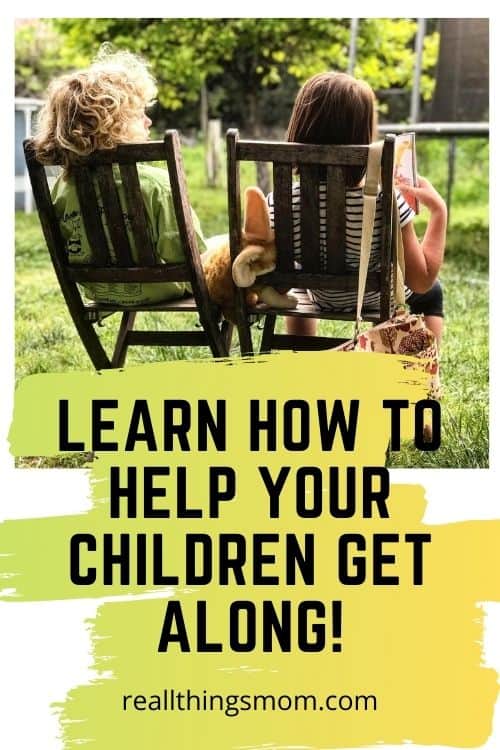
We are nearing the end of the family fun challenge and it has been so good for our family…mostly. But one thing that puts a damper on family fun really quickly is when you’ve gone to the work of planning something, and while executing it, your kids just have to bicker and argue about something dumb! It’s so annoying. How can we help siblings get along?
For my children, their relationships change with the wind. Well, that’s how it seems anyway. It actually changes a lot with the stages of development they are in…and that changes as quickly as the wind.
One of the biggest challenges with helping siblings get along is to remember that they’re not always going to and that’s actually pretty healthy! I chose my husband and we don’t always get along! Our children did not get to choose their family members, so of course, siblings won’t always get along.
It’s okay!! I think all moms have this picture of family dinners together and their children being best friends when they grow up. Yes. It’s in my head too. All of the siblings get along in my head, but reality is not always as beautiful as the pictures we paint in our heads. It doesn’t make you a bad mom if your family didn’t turn out like you thought it would!
And there are also things we can do to help siblings get along better. They’re not fool-proof. They’re not guaranteed. But they do help! The four children in my family are living proof of that!
5 Ways to Help Siblings Get Along
- Give Kids Time Apart—
I homeschool my kids and I often forget that they don’t get to be apart all day like I did with my siblings. We were apart all day and we still fought! Even if your kids aren’t homeschooled; ALL kids have been together more than usual the last few months. And on top of it, our kids share bedrooms. That makes for a lot of time together.
And you can have too much of a good thing.
I try to make sure my kids get breaks from each other, but that’s not always easy. We try to make sure there are opportunities for one to go upstairs to play and one to go downstairs to play. We also teach our children that when a sibling doesn’t want to play and communicates that, they don’t have to get bent out of shape. It’s not offensive to need a break from someone! (Something I learned fairly early in my marriage.)
- Stay up until you fight—
This one is a game-changer…that lasts for a time. My sons had been asking for a later bedtime for several months, but every time I let them stay up later then usual, they were crabby and miserable to be around the next day. So, finally, we told them that if they can quit fighting all.the.time, we’ll consider a later bedtime for them. They have shown us less fighting, and consequently, they have been able to stay up a little later than before.
Now that we have negotiated a later bedtime, if they start to argue and bicker in the evenings, I usually just say, “You can stay up until 10 (for example), or until you fight. Your choice.” And the bickering usually ends. When they go back to their constant fighting cycle, we’ll move the bedtime back to earlier and they’ll have to prove that they can handle staying up later again.
This also works well for kids who still need naps, but don’t want to take them. You can say, “You can stay up until you fight.” It puts the ball in their court and gives them the control that they want. Putting the ball in their court can help siblings get along because it forces them to think about their actions. If they are unable to control their actions, it proves that they still need a nap or an early bedtime.
- Naps—
Well-rested kids are usually better behaved and make better choices than those who are tired. Isn’t this true of adults too? I know that when I am tired, I am more vulnerable to making rash decisions based on emotions than when I am well-rested. I also tend to be more irritable and just on edge, in general. If this is true for adults, whose brains are fully developed, then of course it’s true for kids!
If your kids are on edge and you know they’re becoming run down, have them take naps! They will feel better; live will be easier, and you won’t have to listen to bickering and fighting all day. Plus, you can get something done while your kids nap…or you can nap too, which also can be necessary!
Related: The Importance of Rest
- Play together or work separately—
This is one we use a lot with our kids. If they are arguing and fighting, we tell them plain and simply, “You can either play together, or work separately.” One friend told me that she uses, “Play together or work together.” I have used that too, but I like giving my children the option of working separately. Sometimes, they need a break from each other that badly—that they will choose to work separately. Other times, they want so badly not to have to do more chores, that they will choose to get along. But either way, this is another one of those tools that puts the ball in their court.
It is helpful for siblings to learn to get along because it forces them to make a choice, rather than just have Mom yell in exasperation, “QUIT FIGHTING!” (Yes, this has been tested!) Anytime your child gets a say in what happens next, he or she will be more likely to actually follow through with it.
- Spend time with individuals—
Sometimes the root of the issue runs deeper than you realize. Maybe you have a child who is extremely hot-headed; oppositional; or just really angry about something. Sometimes, sibling rivalry stems from jealousy, as one child feels the other gets more attention or more time with the parent.
The only way to get to the root of the issue is to spend time with your children individually. Sometimes, that’s all the child who is upset more often needs. Maybe she just needs quality time with you. Or, during that individual time, you’ll be able to see what is really going on in your child’s heart and mind.
Some children have a more difficult time processing their emotions than others. Sometimes, they just can’t put into words what is even bothering them. But you know your child. You can help him figure this out. You can help him put his feelings into words by helping him understand different emotional language.
If that doesn’t work, have your child draw a picture! Ask your child to draw how he is feeling and what makes him so angry.
I know that it’s difficult to find the time to spend with each child, but if siblings just cannot get along in your household, it’s good to check in to make sure there’s not a deeper-seated issue.
When siblings can’t along, it can really wear on a mom! We will never be able to make our children get along, but having a few tools in the toolbox can help siblings learn to get along better!
RElated: Reduce Sibling Rivalry
